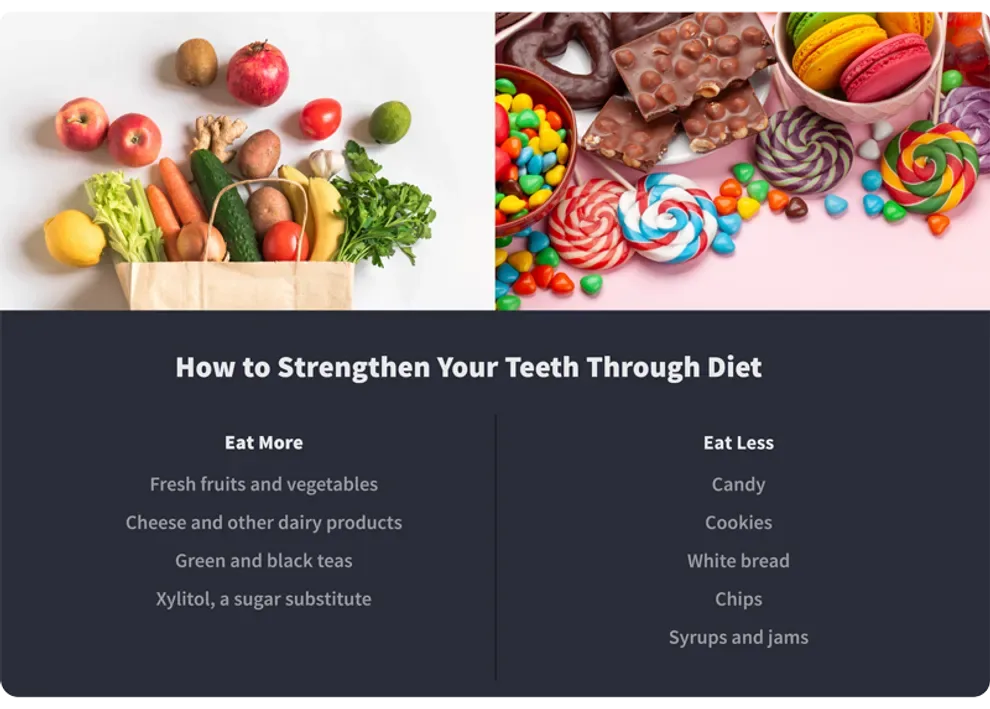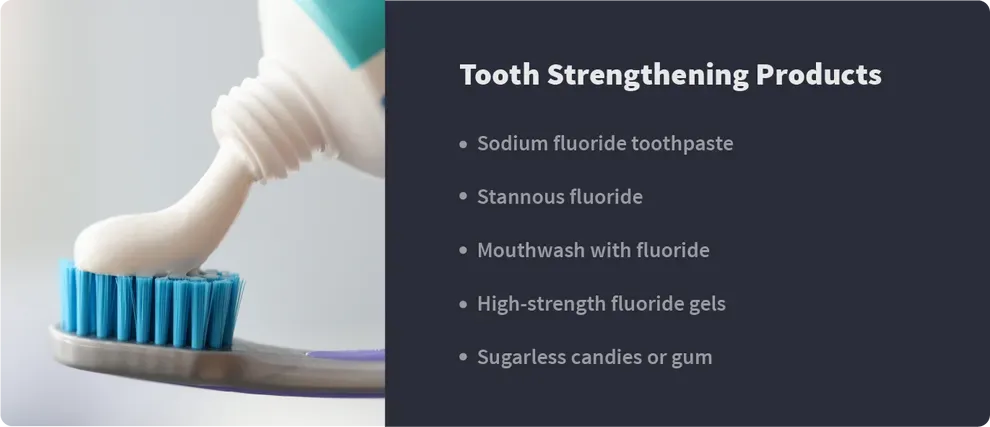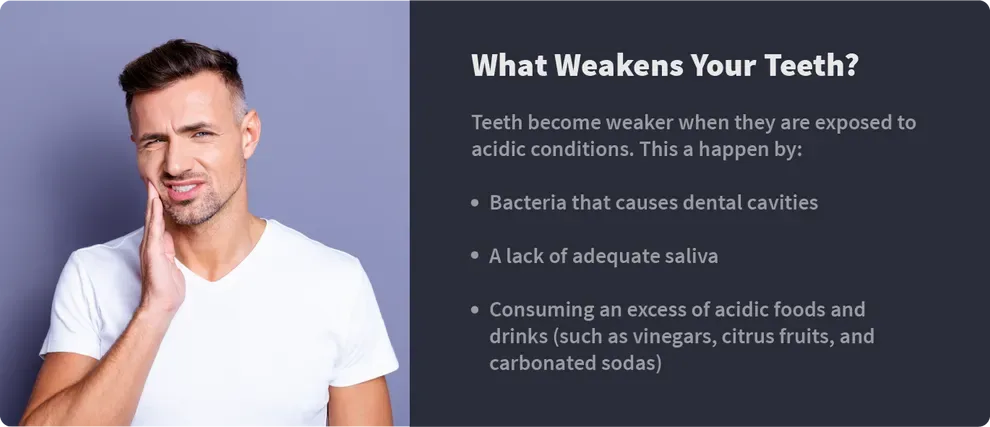Is It Possible to Strengthen Your Teeth? - What Dentists Say

Table of Contents
- Is Teeth-Strengthening Possible?
- Importance of Dental Hygiene
- Importance of Diet
- Tooth-Strengthening Products
- What Weakens Teeth?
- References
When the pH inside your mouth is less than 5.6, your teeth undergo a process called demineralization. The longer these conditions persist, the weaker your teeth become. Once this has gone on long enough, cavity-causing bacteria are able to penetrate the tooth and cause irreversible decay.
Luckily, you can reverse the demineralization process before this point. Increasing the pH of your mouth to 5.6 or above will prompt remineralization, a complementary process which rebuilds your tooth enamel instead.
If you take steps to make sure that your oral pH stays high for most of the day, you’ll experience less decay and enjoy healthier, stronger teeth.
Dentists have several recommendations regarding how to do this, including improving your oral hygiene habits, adopting a tooth-friendly diet, and using certain products.
Is it Possible to Strengthen Teeth?
You can make your teeth stronger over time. At neutral or high pH levels, teeth can rebuild themselves through a process called remineralization. This process can strengthen tooth enamel and reverse incipient (very early) decay. The key to re-mineralizing teeth is to ensure that your mouth spends more time above the 5.6 pH threshold than below it.
Remineralization does have limits. It can’t reverse cavities that have made it all the way to the inner dentin layer of the tooth, and it cannot restore teeth with visible enamel loss.
Even with these limitations, however, promoting remineralization of your teeth can make a big difference in your long-term dental health.
Teeth-Strengthening Through Better Hygiene
If you’re interested in strengthening your teeth through remineralization, there are a few helpful oral hygiene habits you can adopt.
Brush your teeth twice a day for at least 2 minutes each time. This cleans the bacteria out of your mouth and prevents them from
Floss at least once a day. Flossing gets rid of bacteria between the teeth where your toothbrush can’t reach.
Take care not to brush too hard. Doing so can strip tiny amounts of enamel from your teeth.
Wait at least 10 minutes to brush after meals and snacks. Your enamel is softer than usual for about that long after you eat or drink anything but water.
If you don’t have time to wait, swish some water in your mouth a few minutes before you brush. This will help your oral pH return to normal as quickly as possible, and your teeth will harden up again in response.
Strengthening Through Diet

If you want to strengthen your teeth through an improved diet, you will need to eat more of certain foods and less of others.
Fresh fruits and vegetables are rich in vitamins and minerals, many of which contribute to stronger, healthier teeth.
Cheese and other dairy products contain plenty of calcium, a critical mineral for teeth. They also contain phosphates that help your teeth rebuild their enamel.
Green and black teas contain bacteria-fighting polyphenols that help control plaque formation in your mouth.
Xylitol is a sugar substitute made from plant material. While sugar is harmful to teeth, xylitol actually helps to reduce bacteria growth in the mouth and raise your oral pH.
Consuming less of certain foods and drinks can also strengthen your teeth. Avoid foods that are high in sugar and carbohydrates, such as:
Candy
Cookies
White bread
Chips
Syrups and jams
If you do eat these items, save them for mealtimes only. Snacking on these foods throughout the day keeps your oral pH low for longer and robs your teeth of the chance to repair themselves.

Tooth-Strengthening Products
Dentists recommend a variety of products to help strengthen teeth. Sodium fluoride toothpaste is an indispensable part of any tooth-strengthening regimen. Use a pea-sized amount of this toothpaste whenever you brush. Doing this will coat your teeth in fluoride, a mineral which helps your teeth resist acid attacks and rebuilds tooth enamel.
It is important to recognize that only toothpastes with fluoride in them will have this effect. There are many non-fluoride toothpastes on the market. These products may freshen your breath or whiten your teeth, but they do not fight cavities the same way that fluoridated toothpastes do. The only effective substitute for sodium fluoride in toothpaste is stannous fluoride. This compound offers all the benefits of sodium fluoride with additional antimicrobial properties, but it may also cause gray stains on your teeth.
In addition to fluoridated toothpaste, many dentists also recommend using a mouthwash with fluoride. Mouthwashes typically contain very little fluoride, but every little bit helps. Rinsing with one a few times each day will make your teeth stronger, especially if you choose an antibacterial formulation. Avoid mouthwashes with alcohol that may dry out your mouth and lower your oral pH.
High-strength fluoride gels are another extremely effective way to strengthen teeth. When applied to the teeth by a qualified dentist or hygienist, these gels provide immediate and powerful protection from the acids in your mouth. These treatments also contribute to the proper formation adult teeth in children.
Finally, you can use sugarless candies or gum to stimulate saliva production in your mouth. This neutralizes your oral pH and exposes your teeth to all of the beneficial minerals and enzymes that saliva contains, including calcium.
This tip is especially useful for people suffering from dry mouth, but it’s a good idea for anyone hoping to improve their dental health. Choose versions that are sweetened with xylitol for double the tooth-strengthening power.

What Weakens Your Teeth?
Teeth become weaker when they are exposed to acidic conditions. This process is called demineralization, and it occurs when the pH inside your mouth is lower than 5.6. There are many ways this can happen.
Bacteria that cause dental cavities (streptococcus mutans, or s. mutans) produce acid when they feed on the carbohydrates in your mouth. Over time, the acidity wears down the tooth’s enamel, allowing the bacteria to seep into the inner layers of the tooth and infect the pulp. This is how cavities form.
A lack of adequate saliva can also weaken your teeth. One of saliva’s key functions is to neutralize the pH of the acid in your mouth. When there is not enough present to do this, acid levels rise, pH levels fall, and teeth weaken. A common condition called xerostomia, or simply dry mouth, significantly reduces salivary flow. It may be caused by:
Medications, including anti-depressants and birth control
Chemotherapy treatment
Autoimmune diseases such as Sjögren's disease
Uncontrolled diabetes
Old age
Consuming an excess of acidic foods and drinks (such as vinegars, citrus fruits and carbonated sodas) also lowers the pH in your mouth, even if these items do not contain sugar.
